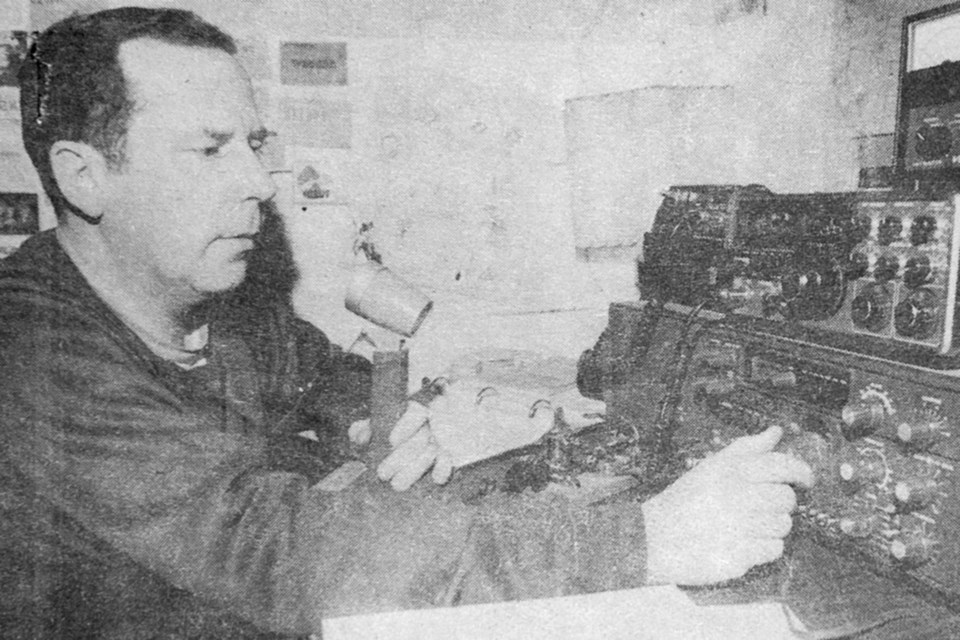Originally published in the Pelham Herald on March 9, 1988. Gerry Letford later retired from the NRPS after some 30 years in policing. Letford passed away on January 28, 2023.
Even now, as you read this, Fonthill resident Garth Hamilton sits in a small outpost on Resolute Bay in the Northwest Territories faithfully maintaining voice communications with the expedition that should reach Canada in about three months.
After two weeks there, he will be replaced later this month by Ridgeville resident Gerry Letford, a communications constable with the Niagara Regional Police Department, who is slated for a three-week vigil.
Both are members of the Niagara Frontier DX Association (the area’s amateur HAM radio club), and both consider themselves extremely fortunate and honored to be involved in a joint Soviet-Canadian polar adventure to ski across the frozen arctic ocean from Cape Arctic in the USSR, to the North Pole, and on to Cape Columbia on Ellesmere Island.
“I’m honored even to be considered,” said Letford, in an interview on Saturday from the somewhat warmer climes of his North Pelham home, where outside a donkey, a dog and a cat lazily bathed in the spring-like sunshine.
“It’s a once-in-a-lifetime opportunity for me- there’s no two ways about it.”
Chilling -40 C
The international polar expedition of 13 skiers (nine Soviet and four Canadian) left from the Soviet arctic last Thursday. En route, the team will have to face some of the harshest conditions on earth — where the temperature hovers at a chilling -40 C and where the shifting ice can suddenly expose the chilling waters of the northern ocean.
The skiers will be guided in part by the stars, and, to an even greater extent, by a talking computer on an orbiting communications satellite that will tell them their location every 100 minutes (let’s hope it’s not called HAL).
Outside of that, the only communication they have with the rest of the world — if they should need anything or if something should go wrong — is through the amateur HAM radio operators.
Gerry said the expedition has to check in at scheduled times. If they don’t, the operator will attempt to reach them on other frequencies. Failing that, the Canadian and Soviet authorities will be contacted, and they could decide to start a search based on their last known position as pinpointed by the satellite.
Communications could be a matter of life or death in an emergency. That’s why it’s a feather in the cap for the local Niagara club to have five of its members (including the two from Pelham) selected by organizers for the all-expense-paid trip to Resolute Bay. Only about 15 in total from across Canada were chosen.
“They usually have two up there at a time,” said Letford.
He explained some of the HAM enthusiasts going up have the knack of being able to find the proverbial needle in the haystack, of picking out a faint voice form a noisy background.
In the midst of a neat but unfinished basement, and under a solitary plant that his wife put up for “decoration,” sits Letford’s “window to the world.”
With his HAM radio set (that takes up no more room than an average component stereo), Letford estimates he’s been in touch with about 180 countries — including Tasmania, which he previously thought existed only as a fictitious country in Bugs Bunny cartoons. That is until one night when an indignant Tasmanian counterpart sent him scurrying to a map of the world that hangs on his cellar wall.
On the other side of the coin, Letford said that the world’s knowledge of Canada isn’t exactly extensive. It would not be unheard of, on a July night, for instance, to be asked how much snow is on the ground, or perhaps to request if he could “jaunt” over to Winnipeg and say hello to a distant Canadian relative.
He’s talked with Soviet and other Communist block citizens, usually staying away from politics and religion, and falling back to the common denominator of all HAM operators— the equipment they use.
“I don’t express an opinion about Mulroney, Turner, or Broadbent, and they don’t knock their government,” he said.
Metropolitan Ridgeville
Right now, Letford’s special project is to reach American counties.
“There’s about 3,000 of them,” he said, “and I’m up to about 600. My goal is to eventually work them all. You get special rewards and plaques for things like that.”
In order to provide his international friends an easy reference point, he usually broadcasts his location as near Niagara Falls, which most people immediately recognize.
“I mean how many people know where metropolitan Ridgeville is,” he said, half apologetically and half humorously.
HAM operators, he said, are rather like fishermen — only with a slight twist.
“We’re like electronic fishermen,” he said. “Only in our case the smaller the country, the rarer it is. So we’re always talking about the small one that got away.”
In Resolute Bay, when Latford is not attending to his vital task of keeping in contact with the polar expedition, he expects to be doing what he spends much of his spare time in Ridgeville doing — operating his HAM radio.
Yes, in more ways that one, he’ll be at the top of the world.
